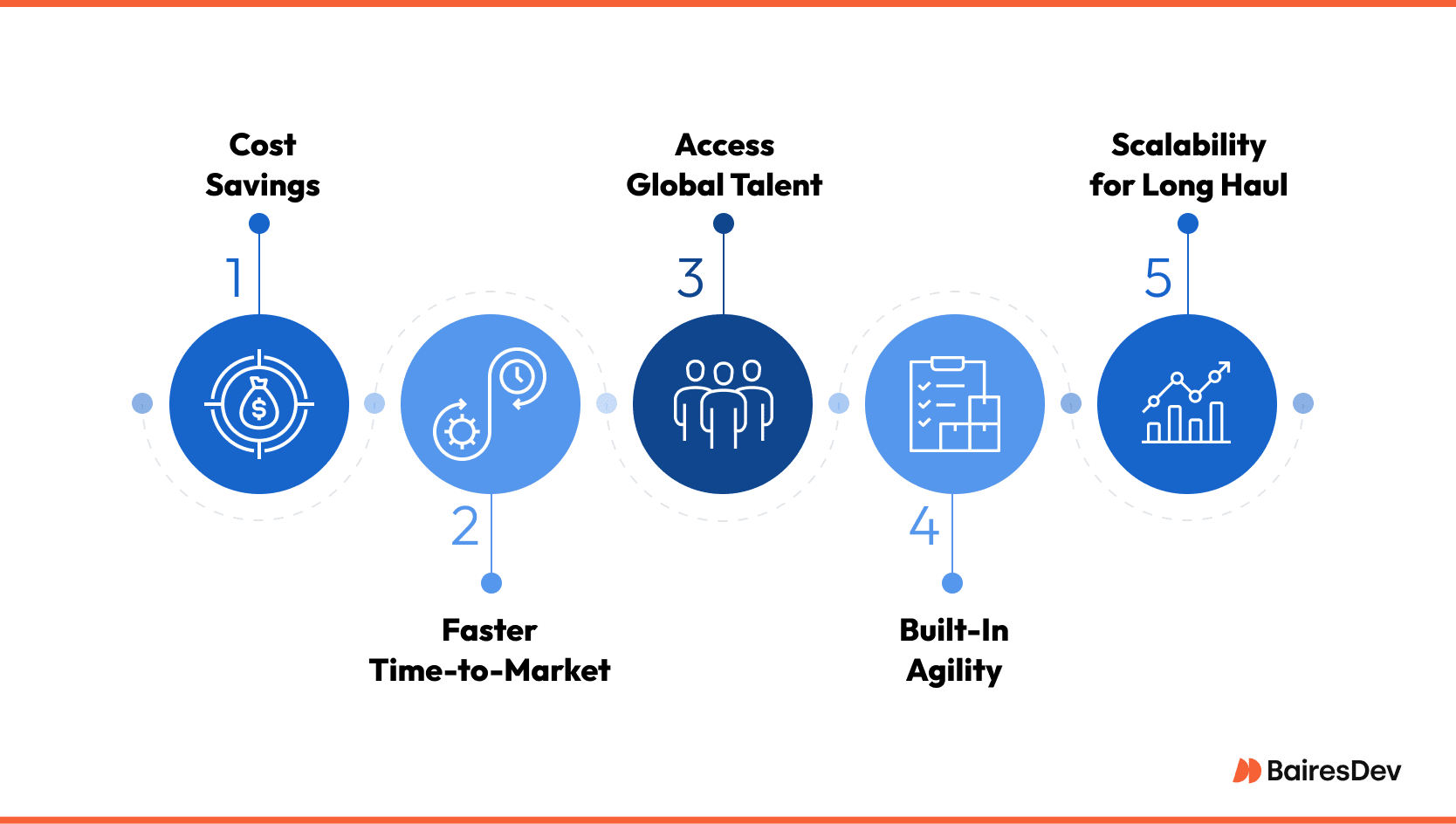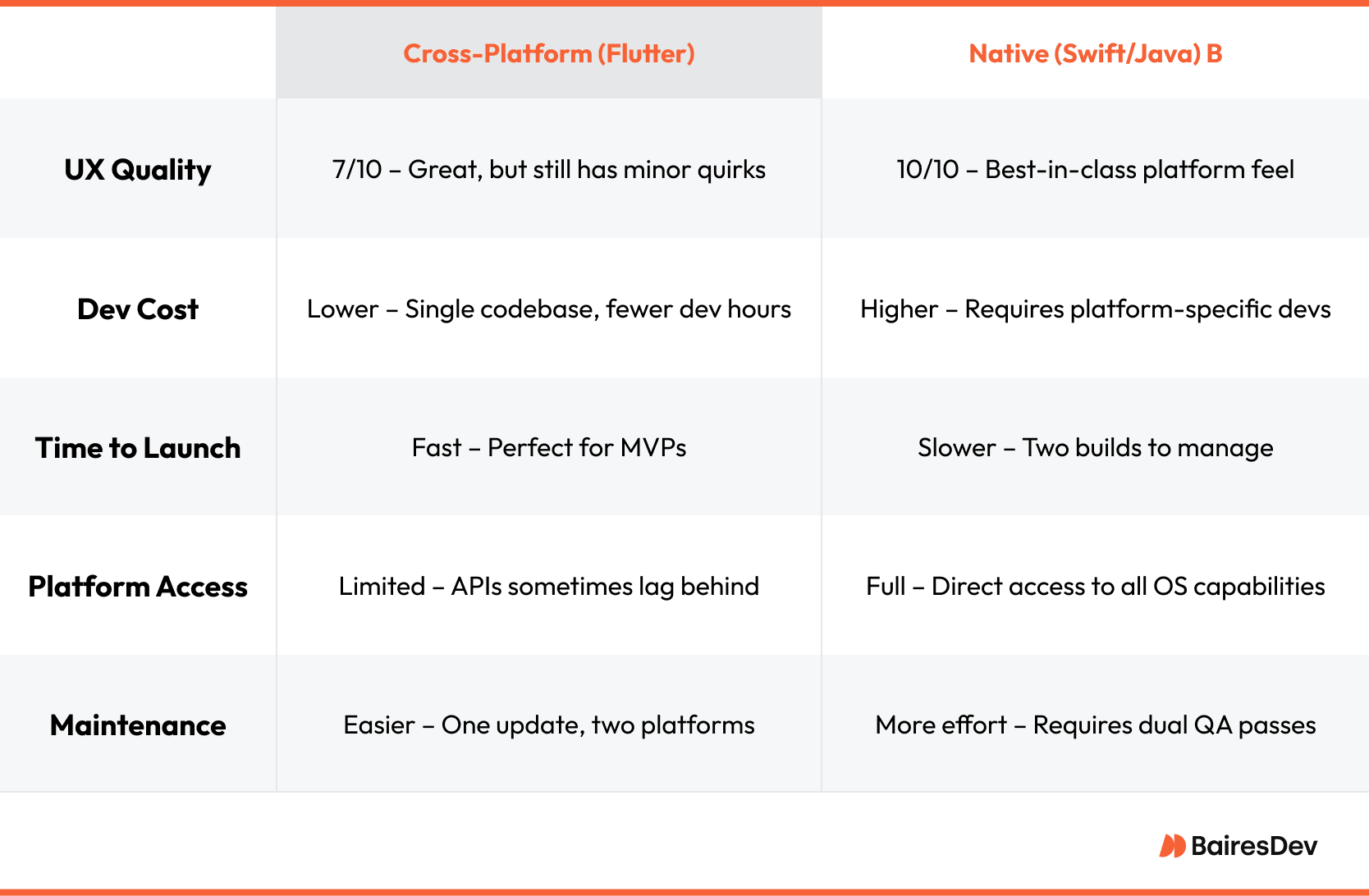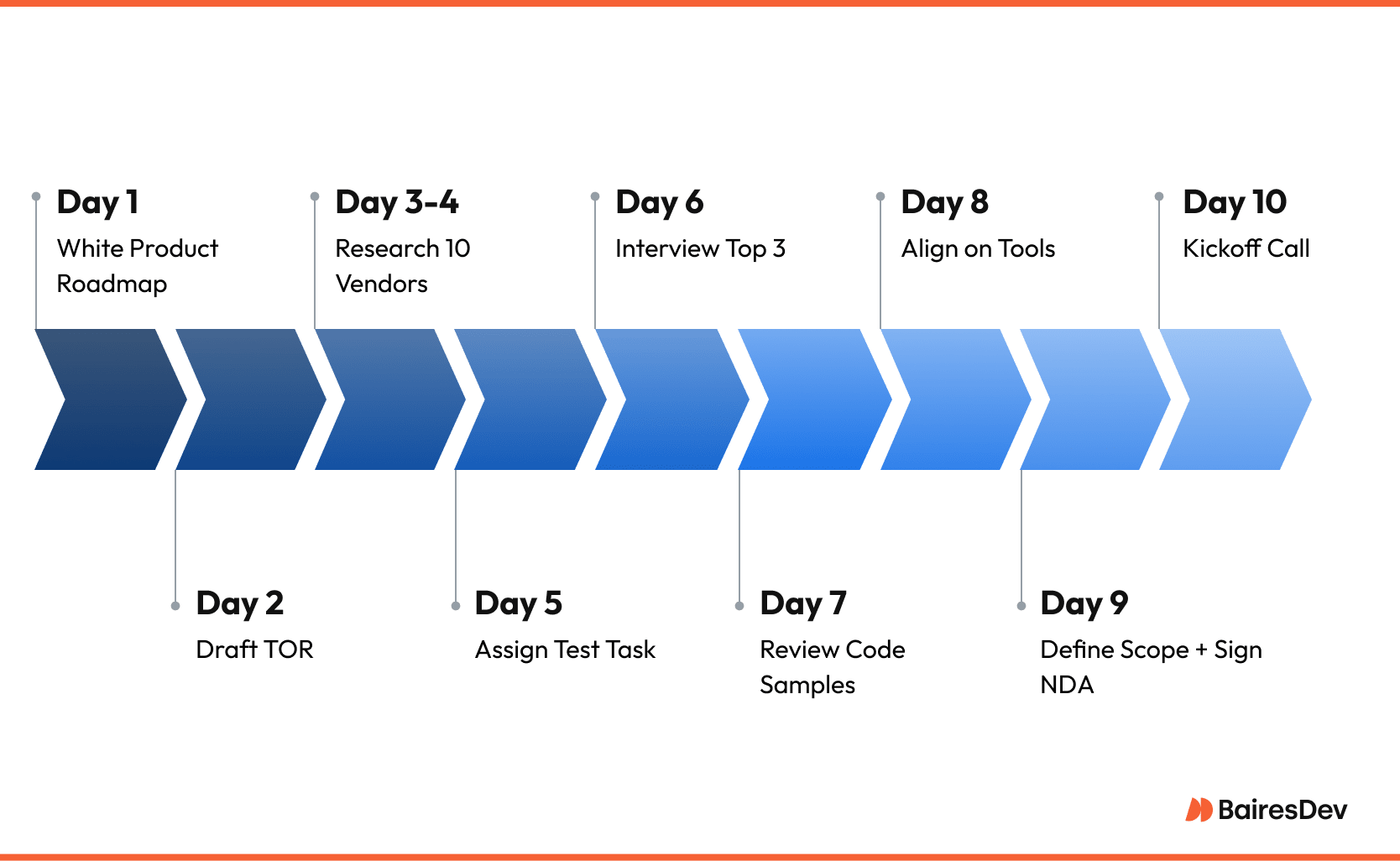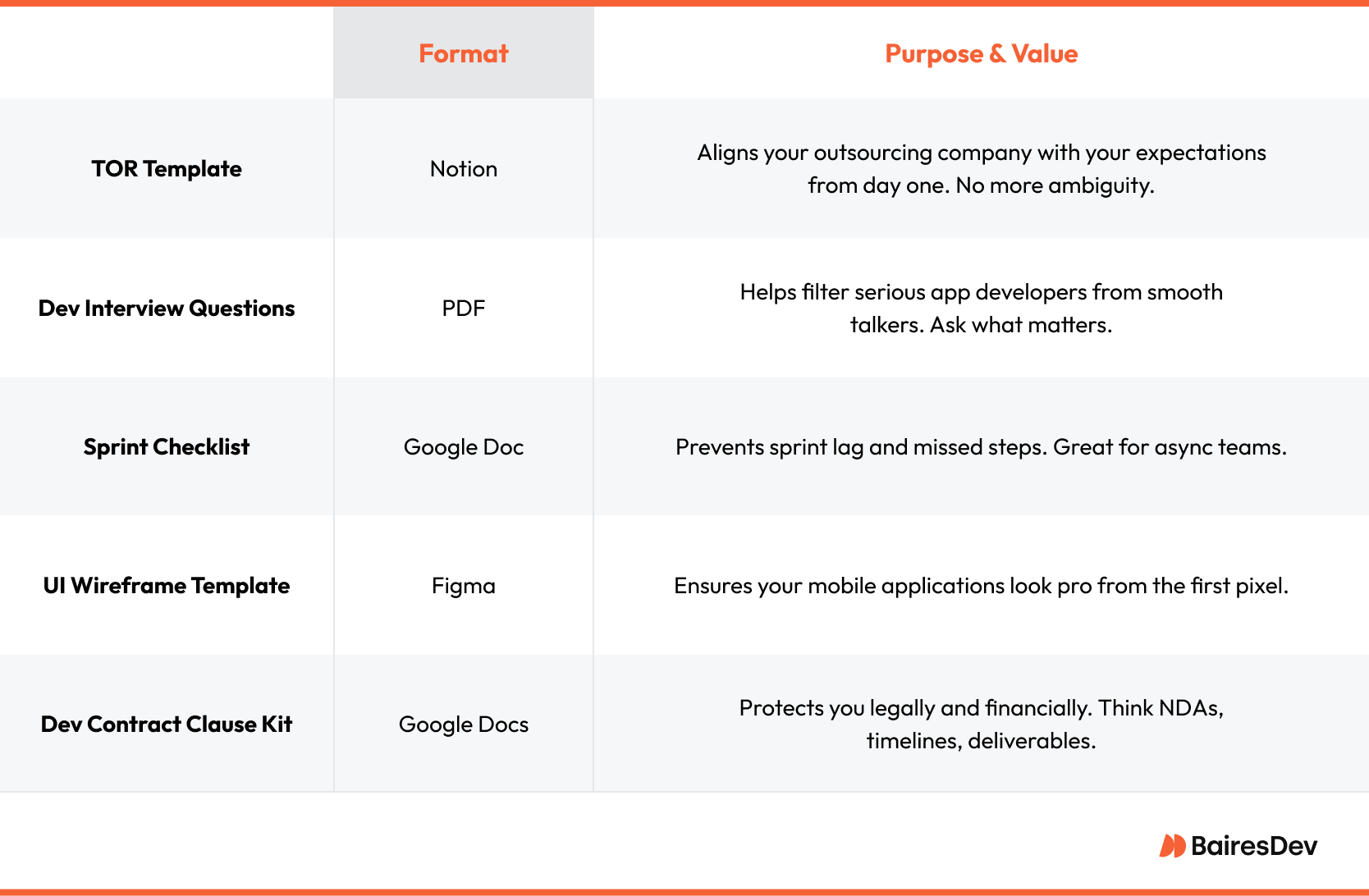You hired a cheap offshore team. Now your app is buggy, your devs are ghosting, and your roadmap is a mess. Startup founders everywhere know this feeling. It’s the sinking dread of realizing your outsourced MVP has turned into a money pit. The culprit is mobile app development that’s based on the lowest bid.
By contrast, great product teams plan, manage, iterate, and communicate like SpaceX. The real magic trick is knowing how to find those teams and how to work with them.
Below, you’ll find your fail-fast playbook. Whether you’re pre-seed or post-Series A, it’ll help you scope smart, vet talent, and build an app development project that fits your budget. From TORs to tools like Jira and Figma, we cover all of it, so you can outsource mobile app development with the same rigor as an in-house team.
What Is Mobile App Outsourcing?
Mobile app outsourcing is the process of hiring an external app development company to design, build, and maintain your mobile app instead of using an in-house team. It gives startups a flexible, scalable way to tap into global talent and reduce overhead during the app development process.
There are three common models:
- Onshore: Hiring a development company in your own country. Great communication, but high cost.
- Nearshore: Teams in nearby time zones. Easier alignment with some cost savings.
- Offshore: Often in Asia or Eastern Europe. Lowest cost, highest risk for communication issues.
Startups typically outsource app development during two key phases: early MVP development or post-funding scale. In the MVP phase, you’re moving fast, burning lean, and embracing MVP or bust. Think of Eric Ries’ The Lean Startup—build, measure, learn. For funded teams, mobile app development outsourcing can scale output without bloating headcount or burn rate.
The right dedicated team can fast-track your project while keeping founders focused on growth, not GitHub issues. But without strong oversight, it’s easy to end up with bugs, delays, or roadmap rot. That’s why choosing the right mobile app development services is as strategic as your product-market fit.
Why Startups Outsource Mobile App Development
Building a product is hard enough. Doing it solo is a recipe for founder fatigue. That’s why so many startups outsource mobile app development. Outsourcing helps them build smarter, faster, and leaner.

Cost Savings Without Cutting Corners
Outsourcing lets you access skilled developers for a fraction of the cost of a local team. You can spend more strategically, and avoid spraying cash at full-time hires. But keep in mind that you get what you pay for. Cut-rate shops burn budget and miss milestones.
Faster Time-to-Market
In startup time, a month feels like a year. Competitive teams know they need to launch in weeks, not quarters. Skilled outsourced teams are up to snuff on platforms like Figma for UI and Slack for coordination. That means they can align and sprint fast. Every delay risks market relevance. Your speed is your edge.
Access to Global Talent
The best app development companies have launched hundreds of apps already. Your project is not their first rodeo. Whether you need iOS polish or Flutter cross-platform speed, a global software development company has already solved edge-case bugs, optimized cold starts, and shipped apps to millions.
Built-In Agility
A lean app development project needs flexibility. When you outsource mobile app development, you can scale your team up or down depending on your funding, feature set, or market response. You’re not locked into a rigid hiring structure. You’re agile from day one.
Scalability for the Long Haul
As you gain more traction, outsourcing gives you more capabilities without rebuilding from scratch. An experienced app development outsourcing partner grows with you, expanding roles and tools as your needs evolve. Your project management stack—Jira, GitHub, Notion—lets you onboard new devs fast and avoid sprint lag.
Common Pitfalls and How to Dodge Them
You won’t see it coming. Your dev stops replying. The sprint stalls. The codebase is a mess. Yes, you need to outsource mobile app development. But without the right safeguards, that MVP dream can send your burn rate to Mars. Let’s break down the traps and how to dodge them.
Dev Ghosting
“The dev just stopped answering Slack. It was like he disappeared off the planet.”
One of the biggest risks when you outsource app development is losing your developer mid-project. Without a contractually backed communication plan or regular updates, it happens more often than you think.
Fix: Always hire two contractors when possible. Double devs prevent a single point of failure. And make Slack updates a non-negotiable part of your project management routine.
Unclear Roadmaps
“Dev churn can be frustrating and ultimately expensive if you don’t have a clear vision and roadmap.”
A weak plan creates chaos. A TOR-free app development project sets you up for scope bombs and sprint delays.
Fix: Use Notion or Google Docs to create a detailed Terms of Reference (TOR) with specs, user flows, and design assets. Whether it’s a mobile app development company or a solo freelancer, give them clarity up front.
UI That Doesn’t Deliver
“If people can’t figure out how to use it, it doesn’t matter.”
Bad UX kills adoption. When you outsource mobile app development to a fly-by-night shop, design can be an afterthought.
Fix: Channel your inner Steve Jobs. Use Figma mockups and UX sprints. Demand at least one final polish sprint before you ship your mobile app to users.
Dev Churn and Code Mess
“You’d need technical skills to know how maintainable and extensible their code was.”
Dev turnover causes onboarding delays and mismatched logic. Someone needs to own the repo.
Fix: Use GitHub with mandatory code reviews. Vet your app development outsourcing company on previous team stability and their approach to clean architecture.
Outsourcing isn’t the problem—blindly outsourcing is. The right app development team can outperform even the best in house development team. But only if you build guardrails before you build features.
Outsourcing Models: What Works When?
Not every situation needs a full-blown app development agency. Whether you’re racing to hit Product Hunt or scaling up like Reid Hoffman, your model should match your speed, scope, and burn rate. Here’s how to pick the right model for your startup phase.

If you need total control over your mobile app development team, go with a dedicated team. It’s pricey but worth it for long-term builds or post-Series A scale. It’s the GitHub-powered workhorse of mobile app development outsourcing.
If you’re instead trying to fill gaps around product design or backend logic, staff aug is the best middle ground. Offshore mobile app developers can plug into your stack fast.
Budget-conscious founders aiming to outsource with predictable costs should focus on a project-based model. Define a TOR, pick your deadlines, and let your app development outsourcing company run with it.
If you’ve got a MacBook Pro and a dream, hire a freelance dev on Upwork to build that one key feature. Just don’t forget the risk of ghosting if you go hands-off.
Create a Dev Vetting Matrix
To coin a spoonerism, hiring a mobile app development team ain’t rocket surgery. But it has to start with a clear-eyed comparison. Use a simple dev vetting matrix to sort the contenders from the pretenders.

Evaluate each app development agency across these five dimensions. “Portfolio fit” matters more than price. “Check portfolios not price” is pure survival advice when you outsource application development in a crowded market.
Before committing to an app development outsourcing company though, assign a small test task. This filters out weak links fast and unearths hidden gems.
Validate their software development style. Do they over-engineer? Push cross-platform without understanding use cases? Spot the warnings early, before your sprint turns into a war zone.
Track everything in Notion, and make it shareable. A test task paired with a dev vet matrix will show which team can deliver your mobile app without wrecking your timeline.
How to Write a TOR That Defuses Scope Bombs
Oh no. You’re mid-sprint, and your developer asks, “What should this button do again?” That’s a bright red flag. A vague brief leads can derail development before it can get started.
A tight TOR (Terms of Reference) keeps development on track. As one founder put it: “List every function, button, and design idea. Even the loading spinner.” Here’s how to bulletproof your brief:
- UI Mockups: Figma or it didn’t happen. Visuals are non-negotiable in modern mobile app builds.
- Dev Environment Specs: Define tools, frameworks, and access points.
- Integration Rules: Spell out how your mobile app developers should connect with APIs, Stripe, or AWS.
- Milestone Dates: Use remote project management practices to structure sprints and checkpoint reviews.
- Feature List: Include must-haves vs nice-to-haves to protect against feature creep.
Agile Tools That Keep Devs Aligned
You’re about to run an MVP sprint without a hitch. Your development team is aligned, communication is tight, and you’re days away from push to prod. Why? Because your tools work like an extension of your team. When you outsource app development, the right toolstack can make or break your development process.

If you’re a business development manager trying to keep a hybrid or in house team on track with an external software development agency, these tools are non-negotiable. Each solves a slice of the chaos, especially in fast-paced mobile app development outsourcing environments.
A smart mobile app agency builds systems around communication. Tim Ferriss would call it high-leverage: automation without hand-holding. Use the right tools, avoid churn burn, and keep your mobile developers in sync across sprints.
Cross-Platform vs Native: What’s the Startup Math?
As much as founders obsess over features, the wrong framework can sabotage even the most forward-thinking app idea. In other words, you need numbers. So what’s smarter: Outsource app development with Flutter, or go full-native with Swift or Java? Let’s look at that.

Flutter can help you outsource app development fast, especially with limited technical expertise or a lean budget. It’s MVP-ready and ideal for validation on Product Hunt. But beware the native snobbery. Some application development pros won’t touch Flutter past MVP.
Native wins when your project manager, quality assurance engineers, and business analysts demand tight performance and platform nuance. It’s the only option if your target audience expects perfection or you’re scaling the entire project beyond prototype.
Most startups go with Flutter-first. Development companies know it accelerates build cycles and cuts down on outsource app development cost. Just keep a dev on deck for the eventual native migration.
Red Flags When Reviewing Code
Your outsourcing team just delivered their first sprint. The interface looks fine, but your project manager can’t shake the feeling something’s off. This is where signs of poor architecture—what devs call “code smell”—start to cause real problems. Poor code today means budget burn tomorrow. Here’s what to watch for in any mobile application outsourcing setup.
- Long Functions: If a single block of code tries to do everything, it’s brittle. A seasoned app developer breaks logic into small, testable pieces.
- No Comments: Code should speak for itself, but smart teams still leave helpful notes. Silent code confuses people, especially when your offshore developers rotate.
- Poor Test Coverage: Without tests, there’s no safety net. You’ll find out something broke when users do.
- No Repo History: Good outsourcing companies use GitHub. No version control? That’s a red flag bigger than your last market research slide deck.
- Monolith Architecture: If your simple app is tangled into one massive file, good luck scaling. Clean code uses modules.
Even without technical chops, a founder with a new app idea can ask the right questions. Pair these checks with business-side cost effective planning and a trusted android developer and you’ll stay out of forking hell.
Best Communication Practices for Managing Remote Teams
A founder in Western Europe pings her team at 10 a.m. Her app developer replies… 12 hours later. Welcome to misalignment. In mobile application outsourcing, great communication is the difference between hitting deadlines and coming up with explanations.
Hold Weekly Sprint Reviews
Hold a standing 30-minute review each week. Walk through deliverables, blockers, and what’s coming next. This setup gives your outsourcing company visibility into project requirements and avoids sprint lag.
Async Updates via Slack
No one wants daily calls across time zones. Use Slack for async standups. Cover yesterday’s progress, today’s plan, and blockers. This keeps outsourcing developers on track without burning your eyeballs out on Zoom calls.
Align Time Zones Early
Clarify core working overlap from day one. Even a 2-hour shared window can prevent “who’s online?” chaos. This simple move improves project estimation and timeline predictability.
Share a Live Notion Timeline
Every team needs a living source of truth. Track tasks, feature status, and user interface design assets in Notion. A Notion timeline helps with business analysis. It also cuts down on back and forth and builds a better understanding of the roles and scope.
Document Expectations
Define preferred tools, response windows, and decision-making flow. Whether you use a fixed price model or iterative billing, make the playbook clear. Miscommunication is the top reason outsource app development fails.
Startups run best when your mobile applications ship fast without chaos. Keep the team aligned, your budget tight, and always have a dev on deck to step in when things get hot.
Founder Case Study: From Dev Ghosting to Launch
It was supposed to be a quick MVP build. Tim, a founder in Western Europe, hired an outsourcing company to outsource app development for his fintech idea. Six weeks in, his app developer ghosted. The UI was half-baked. The repo hadn’t been touched in ten days. Classic roadmap rot.
Tim hit pause. After a few hours on Indie Hackers, he rebuilt his playbook: a detailed TOR, a paid vetting task for each candidate, and a shift to a design-first approach using Figma. “I stopped thinking about code and started thinking about user flow,” he said. His second mobile application outsourcing attempt looked completely different.
This time, he hired two vetted app developers through a curated agency. He used Trello to manage sprints and added a dev on deck clause to ensure coverage. No more churn burn from unexpected disappearances.
The rebuild was faster and more cost-effective than the first attempt. Tim shipped to a closed beta in eight weeks, using Stripe for payments and Flutter for cross-platform reach. “My mistake wasn’t outsourcing,” he says. “It was outsourcing without structure.”
This case study is fictional, but the lessons in it aren’t. With a clear plan and the right team, you can turn failure into version 1.0 of your next success.
10-Day Kickoff Plan: From Idea to Outsourced Sprint
Amazing. Your product idea just went from sketch to sprint-ready in 10 days. That’s the power of a structured launch plan. Follow this timeline to outsource app development with repeatability.

- Day 1: Write Product Roadmap
Use Notion or Trello to map your goals, users, and must-have features. This prevents feature creep. It also gives your outsourcing company clarity from day one. Clean roadmaps lead to clean mobile applications. - Day 2: Draft TOR
Include UI samples, API expectations, tech stack preferences, and a milestone schedule. A strong Terms of Reference saves time, cost, and confusion. - Day 3–4: Research 10 Vendors
Use platforms like Clutch or Hacker News to compare options. Prioritize communication, domain fit, and reviews. Don’t rush. Check portfolios not price. - Day 5: Assign Test Task
Choose a real-world feature to filter out fluff and show which outsourcing company can handle your tech and product thinking. - Day 6: Interview Top 3
Ask about sprint process, code quality, and prior work with mobile applications. Look for both skill and alignment. - Day 7: Review Code Samples
Watch for red flags like forking hell or no documentation. Bad code leads to future churn. - Day 8: Align on Tools
Set up Slack, GitHub, and Figma. Prevent sprint lag with clear workflows. - Day 9: Define Scope + Sign NDA
Finalize features for Sprint 1. Lock in a timeline, contract, and mutual expectations. - Day 10: Kickoff Call
Launch with a full walkthrough of roles, tools, and deliverables. You’re ready to build.
Tools and Templates That Save You Thousands
You don’t need a massive budget to launch smart. These tools below are founder-tested, startup-approved, and purpose-built.

A lean setup with these docs beats a fancy MacBook Pro and no plan. Use them to replace chaos with clarity and guesswork with process. These are the templates Guy Kawasaki would want in every founder’s toolkit: simple, repeatable, effective.
Startup teams who use tools like these build faster, pay less, and avoid most outsourcing company horror stories.
Outsource Mobile App Development: Final Takeaways
You don’t have to burn cash to build your MVP. Avoid the roadmap rot, ghosted Slack channels, and tech stack tantrums. Outsource smart and you’ll launch something you’re proud of.
Stick to your TOR, expect clarity, and push back on feature creep. Tools like Flutter and Stripe let lean teams move fast without shattering the bank. The best founders know when to build and when to buy. Now you do too.
You’re building a product one decision at a time. Just ask anyone at YC Startup School: process beats panic.






